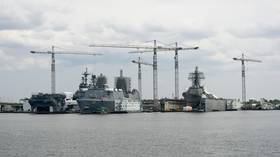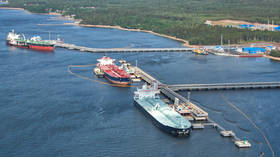Pentagon getting oil products directly from Russia, Ukrainian watchdog claims

A Ukrainian maritime traffic watchdog has flagged a German-operated tanker, claiming that it had likely delivered Russian petrol products to Naval Station Norfolk, a major US military base, in an apparent violation of Washington’s sanctions.
The allegation, which was widely reported by Ukrainian media on Thursday, comes from Andrey Klimenko, head of the Black Sea Institute of Strategic Studies, an NGO, and editor of BlackSeaNews, a pro-Ukrainian news outlet covering maritime trade. He claimed that the tanker Avenca had delivered 50,000 tons of petroleum products from the Russian port of Novorossiysk straight to Norfolk.
The ship is operated by the German firm Chemikalien Seetransport (CST). Public shipping data says it is designed to transport oil products and other chemicals and is currently located in Southern Branch Elizabeth River, south of Norfolk.
Klimenko lamented that his reaction to the “miraculous” delivery “causes neither anger, nor disappointment, only sarcastic laughter.”
In a follow-up post later in the day, he reported that the Avenca could have conceivably carried UAN, a solution of urea and ammonium nitrate that is used as a fertilizer. Such chemicals are not sanctioned by the US, he conceded, before expressing skepticism about the scenario.
Last month, the Washington Post reported that petroleum products originating in Russia kept flowing into the Pentagon's supply chain despite all attempts by Washington and its allies to curb Russian oil profits. It cited as an example a Greek supplier which was allegedly refining Russian-sourced crude, after its origin was laundered through Türkiye.
Western sanctions on Russian energy were intended to deny Moscow profits and cripple its economy in retaliation for its role in the Ukraine conflict. One of the devised mechanisms is the price cap, which G7 nations sought to enforce by leveraging their influence on key shipment services, such as insurance. It has largely failed, Western officials and media have acknowledged.
Meanwhile Russia’s reliance on energy trade is decreasing, according to President Vladimir Putin. Speaking at VTB Bank’s ‘Russia Calling’ forum on Thursday, he said non-energy-related sectors were the main drivers of Russian economic growth this year.
“Now let’s see them try to call Russia a gas station,” Putin mused. The late US Senator John McCain once used the phrase as a dismissive assessment of the country’s economy.













